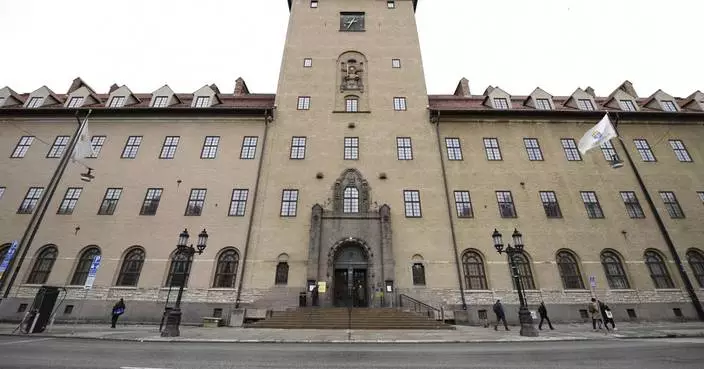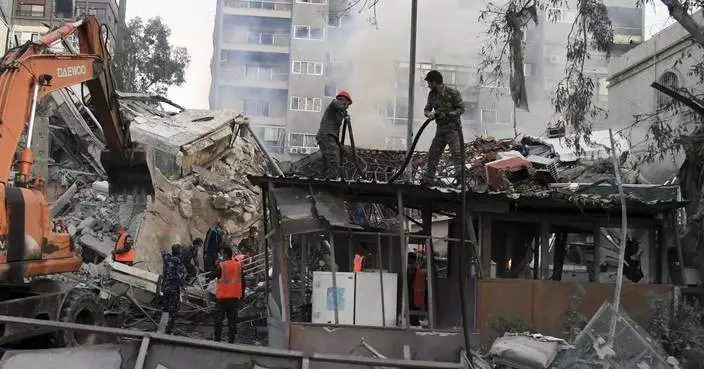Hundreds of thousands of Syrians face continued displacement each coming year that the conflict continues and economic conditions deteriorate, the Norwegian Refugee Council said Monday.
Economic deterioration and hardship are increasingly driving Syrians out of their homes, but the number of displaced will be higher if large military operations resume, according to a report by the humanitarian group.
The Syrian conflict, which marks 10 years later this month, has resulted in the largest displacement crisis since World War II, with an estimated 2.4 million people displaced in and outside Syria every year since the war begin in 2011, the council said.
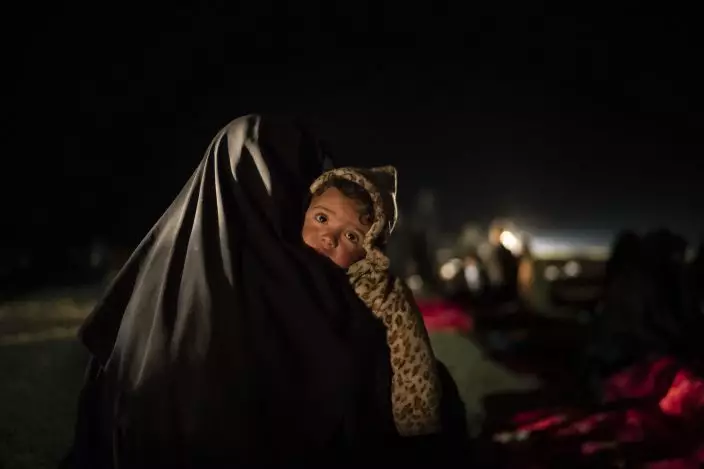
FILE - In this Feb. 25, 2019 file photo, a woman carries her baby at a screening center run by U.S.-backed Syrian Democratic Forces after being evacuated out of the last territory held by Islamic State militants, outside Baghouz, Syria. Hundreds of thousands of Syrians face continued displacement each coming year if the conflict continues and economic conditions further deteriorate, the Norwegian Refugee Council, a prominent humanitarian organization said Monday, March 8, 2021. The Syrian conflict, which marks 10 years later this month, has resulted in the largest displacement crisis since World War II, the council said. (AP PhotoFelipe Dana, File)
Secretary General of the Norwegian Refugee Council Jan Egeland called it a “decade of shame for humanity."
The conflict has left Syria divided and in ruins. Nearly half a million people have been killed, a million children born in exile, and the fate of tens of thousands of people imprisoned or forcibly disappeared remains unknown.
Of the country’s 23 million pre-war population, nearly 5.6 million are refugees living in neighboring countries and Europe. Some 6.5 million are displaced within the country, most of them for over five years.
In 2020, 1.8 million were newly displaced, according to the humanitarian organization, even though fighting subsided after the Syrian government restored control over most territories in military operations. In the same year, for every person that returned home, nearly four were newly displaced.
At least 60% of those newly displaced in January were forced to leave home because of deteriorating economic conditions and lack of services, the council said.
To reverse the stalemate in the conflict, the council called for a nationwide cease-fire and a political settlement.
It predicted the Syria crisis could see at least 6 million more displacements over the next decade if the conflict and economic deterioration continue at the same rate. It said there are little prospects for refugees and displaced people to return home with the lack of security and a political settlement.
Years of U.N.-sponsored peace talks have led nowhere. Presidential elections expected this spring feature a single candidate — President Bashar Assad, whose government and military forces oversaw the conflict.
Meanwhile, 23 million people, including 13.4 million Syrians and members of refugee-hosting countries are in need of humanitarian assistance, the largest number in the region to date, said Samah Hadid, head of advocacy and media at the Norwegian Refugee Council.
The coronavirus pandemic has only exacerbated needs and put strains on international assistance that has so far largely failed to keep up with the deepening crisis.
Major donors to Syria's humanitarian programs, such as the United Kingdom, already plan to cut as much as 67% of their funding for the war-torn country, according to leaked documents last month.
“This is huge,” Hadid said. “The cuts just further indicate the world abandoned Syrians at a time when needs and suffering are growing across the country."
Hadid said there is a need to consider more sustainable aid for Syrians, many of whom need help finding jobs. Some are returning to displacement camps because of lack of services or security.
“They are facing poverty, which is rising and they can't flee for safety," she said. “So they are completely stuck and they are going to be displaced for many years to come."
BEIRUT (AP) — Amnesty International said Wednesday it has documented widespread abuses, including torture and deprivation of medical care, in detention facilities holding thousands of suspected Islamic State members and their relatives in northeast Syria.
The centers and camps hold about 56,000 people — the majority of them children and teens — and are run by local authorities affiliated with the U.S.-backed, Kurdish-led Syrian Democratic Forces. The SDF and its allies, including U.S.-led coalition forces, defeated the Islamic State group in Syria in 2019, ending its self-proclaimed Islamic “caliphate” that had ruled over a large swath of territory straddling Iraq and Syria.
What to do with the suspected IS fighters and their families has become an intractable issue. Many countries whose citizens traveled to Syria to join IS have been reluctant to repatriate them, as have local communities in Syria.
"People held in this system are facing large-scale violations of their rights, some of which amount to war crimes,” Nicolette Waldman, Amnesty’s senior crisis advisor, told journalists.
The United States is also responsible for the alleged violations because it played a key role in establishing and maintaining the detention system, providing hundreds of millions of dollars to the SDF and affiliated forces and regularly interrogating detainees, Waldman said.
The human rights group interviewed 126 people accused of IS affiliation currently or formerly detained, along with representatives of the local administration and aid workers.
The Amnesty report said the vast majority of detainees are being held “indefinitely, without charge or trial, in violation of international human rights law and international humanitarian law,” while those who have been tried were, in many cases, convicted on the basis of confessions extracted under torture.
The alleged abuses include “beating, stress positions, drowning, electric shocks and gender-based violence,” including a male detainee who said he and others had been sodomized with broomsticks by guards, the report said. Detainees were also deprived of food, water and medical care and subjected to extreme cold and heat in overcrowded cells, with some allegedly dying of suffocation, it said.
The report added that many of the approximately 14,500 women and 30,000 children held had been victims of human trafficking, including women who were forced to marry IS fighters and minors who were forcibly recruited by the group, and that local authorities had failed to set up a “mechanism to identify trafficking victims” and protect them.
The report also criticized the practice of forcibly separating adolescent boys — some as young as 11 or 12 — from their mothers and placing them in rehabilitation centers indefinitely.
Amnesty called on local authorities, the U.S. government and other allies to bring the detention system into compliance with international law and urged the United Nations to work with them to establish a screening process to release all who are not “reasonably suspected” of having committed a serious crime.
The Autonomous Authorities of the North and East Syria Region, the civilian administration affiliated with the SDF, wrote in response to the Amnesty findings that it had not received any official complaints regarding torture in detention facilities and “if this happened, they are individual acts.”
The administration said it would take action against employees who committed violations if evidence is provided. It denied allegations that inmates were deprived of food, water and medical care. It acknowledged overcrowding in the facilities, which it attributed to lack of financial resources to secure larger centers.
The local authorities took issue with the allegation that people were arbitrarily detained, asserting that most detainees “are members of a terrorist organization and were arrested during the battles" and that many had committed crimes against humanity and war crimes.
The U.S. State Department said in its own response that “we share many of (Amnesty’s) concerns” and it has been working to address them. It called on the international community to “aid local entities’ management of these challenges” and for countries with citizens held in detention in Syria to repatriate them.
Waldman said she believes Washington "very likely knew about these poor conditions from the beginning."
She added: “We think that it may not be the case that they are doing everything they can. They need to accept a much greater responsibility, especially since they played such a key role in establishing the situation in the first place."
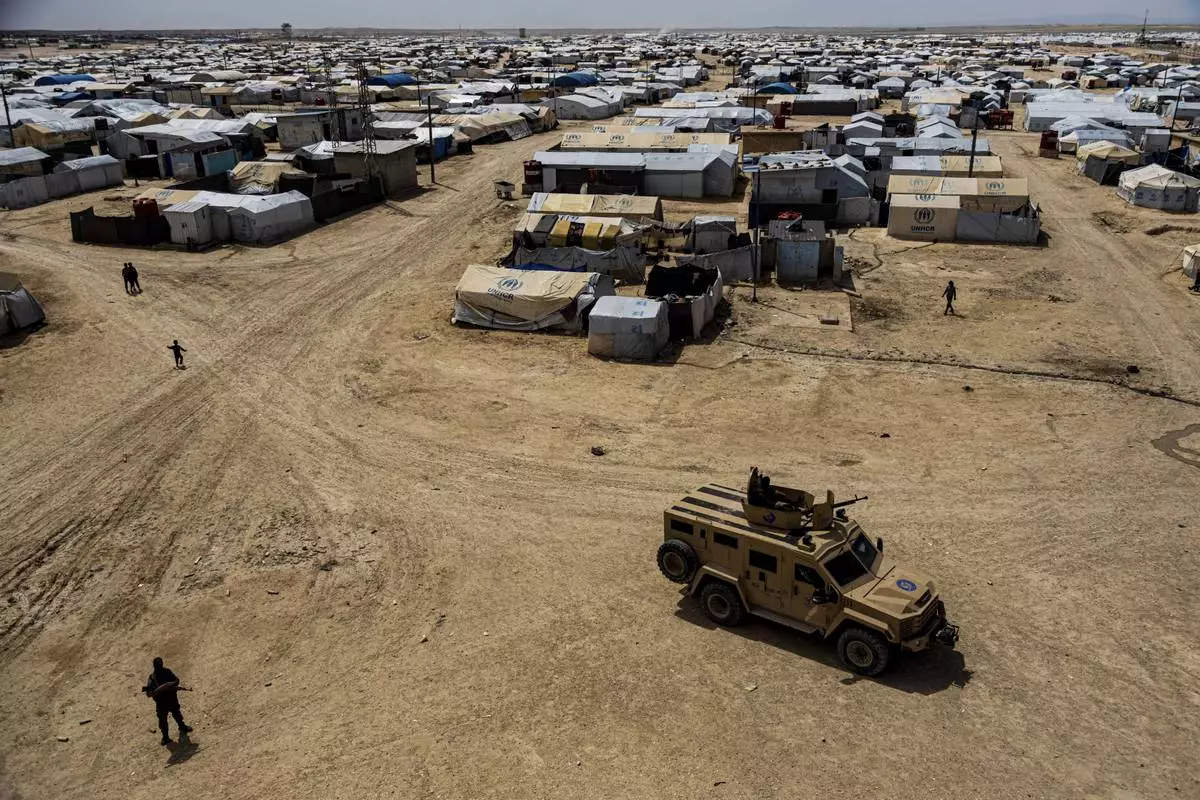
FILE - Kurdish forces patrol al-Hol camp, which houses families of members of the Islamic State group in Hasakeh province, Syria, on April 19, 2023. Amnesty International said Wednesday, April 17, 2024 it has documented widespread abuses, including torture and deprivation of medical care, in detention facilities holding thousands of suspected Islamic State members and their relatives in northeast Syria. (AP Photo/Baderkhan Ahmad, File)
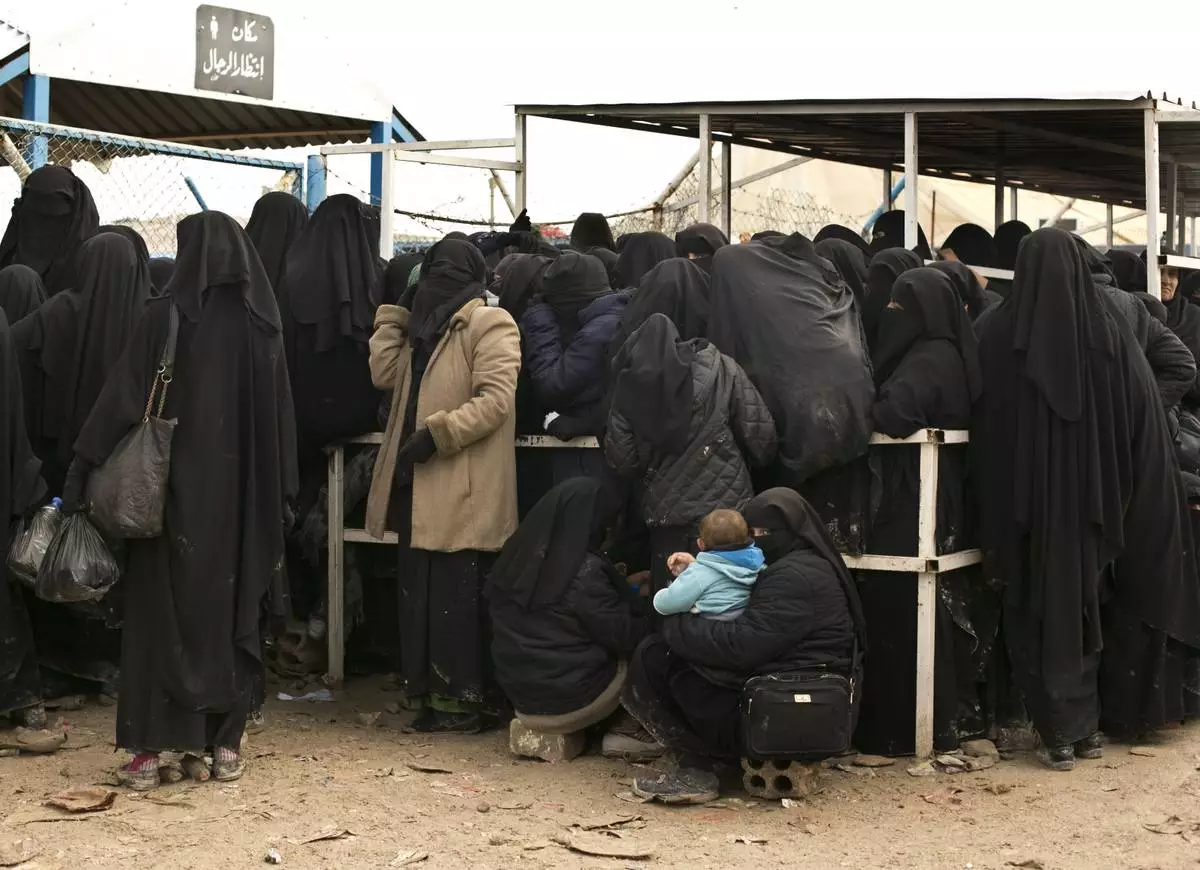
FILE - Women residents from former Islamic State-held areas in Syria line up for aid supplies at Al-Hol camp in Hassakeh province, Syria, March 31, 2019. Amnesty International said Wednesday, April 17, 2024 it has documented widespread abuses, including torture and deprivation of medical care, in detention facilities holding thousands of suspected Islamic State members and their relatives in northeast Syria. (AP Photo/Maya Alleruzzo, File)








